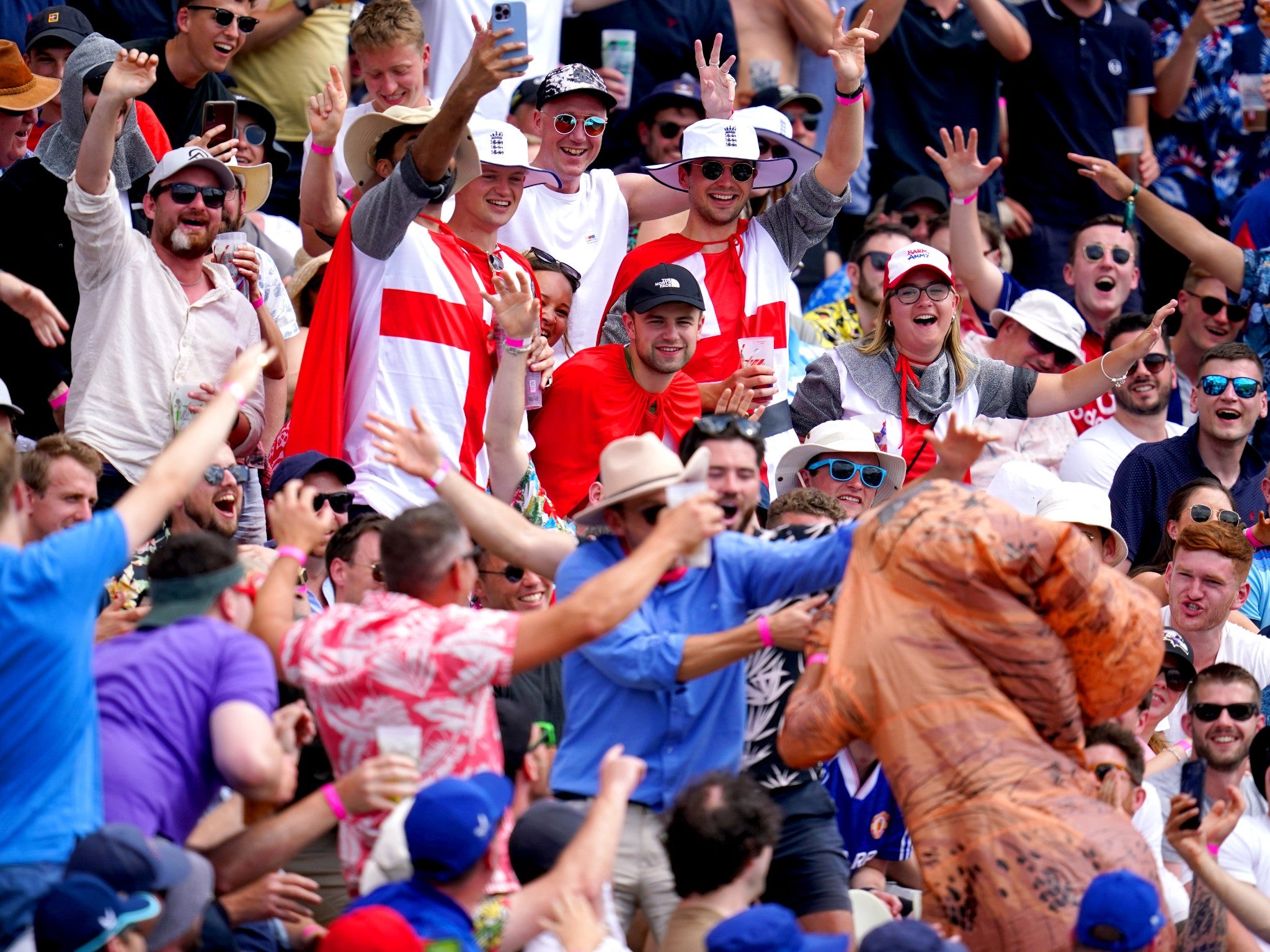Excess all areas: How the British sporting summer turned into one never-ending booze cruise
From Goodwood to Henley, and Ascot to the Ashes, a collective and chaotic inebriation has taken over the grandstands of our summer sports, writes Jim White. It’s an endless source of shame


The slope on the footpath leading down from Ascot racecourse to the railway station is not exactly what you would call vertiginous. Tour de France riders are unlikely to regard it with trepidation. Yes, there’s a bit of an incline, but rope and crampons, it might be thought, are not required.
But at the end of a day’s racing during last week’s Royal Ascot meeting, it looked like the final few yards in the ascent of Everest.
A woman in a flowing summer gown had fallen at the top and was lying on the tarmac, cackling as her friend filmed her squirms and rolls. Further down, a bloke in full top hat and tails – quintessential Ascot regalia – was clutching the fence, inching his way slowly downwards towards the station. Nearby, a woman wearing the kind of fascinator Princess Beatrice might describe as a touch “elaborate” was walking sideways, stopping after each slow, pained step to yell abuse at her partner for not organising a taxi.
And by the time they finally reached the platform from which the trains to London departed, they were confronted by a scene more akin to a painting by Bruegel. Someone was being sick on the tracks, several dozen people had apparently lost the ability to stand – and, in the middle of the crowd, a space was opening up around a man in a white suit who, it was clear from the evidence spreading across the material, had just soiled himself.
Welcome to Britain’s summer of sport. It will be much the same at the Test matches. At Goodwood, at Cowes and at Henley: glorious sporting endeavour will be celebrated among those watching by the kind of collective inebriation that might be considered excessive at a boozy wedding.
It is the great unspoken of our festival of whacking balls, racing horses and paddling boats: alcohol underpins it all. This is how we watch these days: through the bottom of a glass. Or, if you are at a rugby match at Twickenham, your view is blocked by those on the row in front constantly getting up to visit the bar. Or the gents. Or both.
Yes, drink has taken over our sporting life. And, the thing is, the events themselves have financially come to rely ever more on us all getting completely blotto. Take Old Trafford, where the fourth Ashes test will be staged at the end of July. A Lancashire Cricket Club executive once told me that this was when the county makes the profit that sustains it through the year. This is how the batsmen and bowlers on the first team are paid: through alcohol sales.
There were extra bars studded through the stadium, with hundreds of staff drafted in to ensure there were no queues for the booze. They budgeted for an eye-opening 100,000 pints of beer being sold every day. With a crowd of 26,000, that means an average consumption of four pints per head.
When I went to an Ashes test there with my son, the two blokes in front of us in the main stand were so fastidious in their attempts to ensure that the drinking average was maintained, that both were comatose by teatime.
At Ascot too, the bottom line is sustained by alcohol: they reckon to sell some 80,000 bottles of champagne and 60,000 jugs of Pimms, quickly ensuring any winnings at the bookies are hoovered up by the adjacent bar. The effects of all this were visible in the Windsor Enclosure last week, where a group of blokes engaged in a mass brawl in which, fortunately, most of the punches flew several yards wide.
It is an economic pattern spreading across our sporting calendar. In America, Liv Golf made much of its more relaxed attitudes towards spectator behaviour. There, players were not obliged to tee off in silence. Music blared constantly from loudspeakers, accompanied by frat boy boozing, with noisy blokes in shorts and polo shirts spraying each other in plumes of beer – which is intriguing, given the competition was organised by the Saudis. And now they have taken over all golfing competitions, booze will no doubt be part of their new drive to loosen up the sport, modernise it and make it more democratic. As we will no doubt see at this September’s Ryder Cup.
Even prim and proper Wimbledon, in which the length of matches often eats up the time otherwise spent at the bar, has seen a gradual uptick in boozing. Or, at least, that was what the Australian maverick Nick Kyrgios thought when he accused a woman on Centre Court last summer of heckling him while inebriated. Though, as it turned out, he had picked on the wrong target and he was obliged to apologise to the woman concerned.
Interestingly, despite the consequent loss of potential income, the Paris Olympics this week announced that alcohol sales will be banned from all its venues next summer, apart from in the corporate hospitality sections. We can only assume the organisers went along to Ascot last week and saw the effect the easy availability of liquor can have on a crowd.
It is not to be puritanical to see the irony in all this. Here, we are increasingly celebrating athletic endeavour by getting off our faces, watching the very finest in action while drinking beyond any reasonable measure. All those healthy side effects of physical pursuit, nullified by booze. And the organisers themselves making it ever easier for us to shed our inhibitions in order to profit from our excess.
This is what our glorious summer of sport is fast becoming: an endless source of shame.
Join our commenting forum
Join thought-provoking conversations, follow other Independent readers and see their replies
Comments


Bookmark popover
Removed from bookmarks